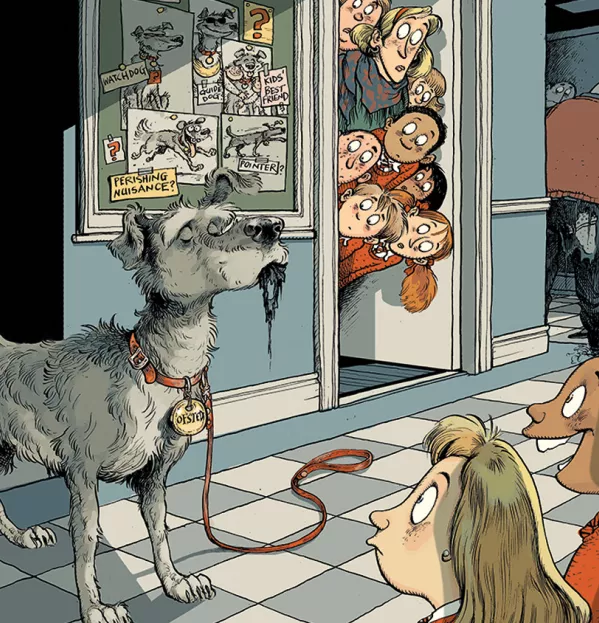Ofsted is a loyal watchdog trying to give parents security

I have been a regular attendee at the Hay Festival with my family over the years. This year will be my first time at Hay as an “artist” (the organisers’ classification, definitely not mine) and I’ve been reflecting on what might be of interest for such an audience of deeply inquiring minds, including many parents. How can we make sure Ofsted works for them?
We know that Ofsted matters to parents. Our inspection report pages are viewed more than 30 million times a year, and while not all of these viewers are parents, we can be confident that a significant proportion are. In addition, our online service, Parent View, which lets parents give feedback on their child’s school, is viewed over a million times a month (with around a quarter of a million new reviews a year).

Independent surveys of parents’ attitudes towards Ofsted reveal that almost threequarters of parents believe we provide reliable information. Nine out of 10 know the Ofsted grade of their child’s school. We also know that inspection judgements are one of the top factors parents look at when choosing a school. Then there is the Rightmove factor, highlighted both anecdotally and by emerging academic research - a change to an Ofsted judgement directly affects house prices, whereas a change in performance table rankings does not.
With all of this riding on our reports, we clearly have a huge responsibility to parents to make sure that we provide relevant, timely and useful information. That is why over recent months we have been working with groups of parents to get a better feel for what they need and want from Ofsted. It won’t surprise you to learn that this doesn’t always tally with what teachers and school leaders want. The challenge for Ofsted is balancing needs so that everyone who relies on our work gets real value.
Outdated reports
The groups of parents were clear about the importance of Ofsted in their decision-making. They told us that they worry that schools have an opportunity to hide disruptive children - although it is fair to say they mostly believe schools get significantly more notice of an inspection than is the case. They also worry about the length of time that many “outstanding” schools go without an inspection and whether this means they can really rely on our judgements of schools, which in some cases were made over 12 years ago.
In fact, if we did everything parents wanted, and money was no object, a new school inspection framework would look something like this: inspection of all schools at least every three years, preferably more often; definitely no notice given; no exemptions for “outstanding” schools; more comparison with other local schools; and much more reflection of parents’ views and experiences in the report.
The report would have significantly more detail about behaviour and discipline, and also about what makes a particular school distinctive - what is a day like for a child in that school. Parents also value the ability to provide more detailed, free text and views on schools throughout the year, not just during inspection. They want reports that are easy to understand with headline judgements.
I think it’s fair to say that, compared with other feedback sites such as NHS Choices, we still have some way to go in giving parents the opportunities to make their views heard, and ensuring that reports present the information they need to see.
Of course, parents are just one audience and ensuring that we build an inspection framework that gives teachers and leaders what they need, as well as the government and policymakers, is just as important. Equally, at Ofsted we are always sure to remind ourselves that we exist because we are funded by, to deliver for, the taxpayer.
I am proud of the effort that the whole of Ofsted puts into engagement with the education sector. We are a confident part of the conversation and debate, whether through the pages of this magazine, at roundtable discussions, on the conference stage or in the Twitter ether. Over the months ahead, before we launch any consultation, we will continue to engage everyone with an interest in education. As ever, we will refine, test and reiterate our thinking as we go.
But it is essential that we don’t lose sight of other important audiences and don’t just listen to the same “usual suspects” or get trapped in groupthink. Important though Twitter debates are, the truth is most people don’t spend their evenings debating inspection and accountability in 280 characters, and it’s that silent majority we need to reach.
After all, Ofsted was set up as part of the Citizen’s Charter over 25 years ago, a landmark in public sector accountability. We want to remain true to that origin; to continue to give children and parents the information they need to be assured, to challenge and to make informed choices.
Amanda Spielman is Ofsted’s chief inspector
You need a Tes subscription to read this article
Subscribe now to read this article and get other subscriber-only content:
- Unlimited access to all Tes magazine content
- Exclusive subscriber-only stories
- Award-winning email newsletters
Already a subscriber? Log in
You need a subscription to read this article
Subscribe now to read this article and get other subscriber-only content, including:
- Unlimited access to all Tes magazine content
- Exclusive subscriber-only stories
- Award-winning email newsletters